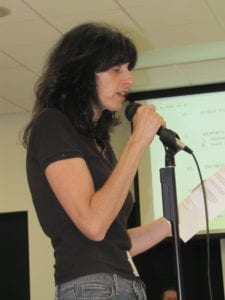Three Village school district parents say it’s time for a new start
Board of education listens to pleas to let students begin school later in the day

By Andrea Paldy
It’s about time. That’s what a group of parents told the Three Village school district board and administrators last week when they asked for later start times for the district’s three secondary schools at the Sept. 4 board of education meeting.
They wore their conviction on stickers that said, “It’s about time: Three Village parents for a later start time,” and filled rows in the board room to show their support for the cause.
School board members and administrators listened, with board president William Connors promising that the discussion would continue.

Parents, fortified with research and statistics to illustrate the consensus within the medical community, spoke about the toll sleep deprivation takes on the physical, emotional and mental well-being of adolescents.
“Unlike other districts that have nonetheless successfully implemented the shift, you have our full support,” said Barbara Rosati, research assistant professor in physiology and biophysics at Stony Brook University.
The mother of a P.J. Gelinas eighth-grader and founder of the recent movement in the Three Village district, Rosati went on to say, “We encourage you to reexamine this issue today in a different socioeconomic context and with the renewed attitude of asking, not whether this can be done … but how this will be done here.”
Since first bringing the issue to the board in June, Rosati has organized two parent information sessions and launched an online petition that went live this week and gathered over 500 signatures in the first 24 hours. In addition to her request for a later start time, she has also asked the district to sponsor sessions with sleep experts for the school community and to include sleep hygiene in its health curriculum.
Marlo Dombroff, the mother of two secondary students and a clinical assistant professor and chief physician assistant in the division of gynecologic oncology at Stony Brook University, reiterated the dangers of sleep deprivation in young people, which she said, “negatively impacts their ability to learn, weakens the immune systems, leading to more missed school days, causes anxiety and depression, which leads to increased risk of suicide, increases accidents … and later in life, causes increased risk of hypertension, diabetes and obesity.”
Research shows that changes in adolescents’ circadian rhythms make it difficult for them to fall asleep before 11 p.m. This is one of the reasons that the American Academy of Pediatrics, the American Medical Academy and American Academy of Sleep Medicine recommend that middle and high schools start at 8:30 a.m. or later, so that students can get the recommended 8 to 10 hours of sleep their bodies need.
During a phone interview, Superintendent Cheryl Pedisich agreed that the “research is 100 percent valid.” She added, though, that there are many variables to consider when it comes to shifting the school schedule.
“This is not that black and white, and, of course, students’ health and well-being are critical to us,” she said. “We’ve increased our clinical staff throughout the district. When people were making cuts, we never touched our clinical staff because we do believe our students’ mental health is critical.”
The last time the district looked at changing the 7:05 a.m. and 7:35 a.m. high school and junior high start times, a number of issues presented themselves, said Pedisich, who was co-chair of the committee that discussed the issue in 2010 and into 2012. Both elementary and secondary parents were on the committee, which discovered among its findings that parents of elementary school children were against the idea of having their young children home at 1:30 p.m., Pedisich said.
Additional considerations were transportation, scheduling for athletics, BOCES and the elementary music program.
Last week’s speakers noted that many secondary students don’t ride the bus because of the early start times and suggested that a time change could be an opportunity to make district transportation more efficient and cost-effective.
“You are not alone. We can and we will help you,” Rosati said, offering access to experts who could help ease the transition.
While she would be willing to hear from those experts, Pedisich said the district’s transportation needs are special, in part, because the district buses all of its students unlike other districts. She also pointed to topographical issues with the layout and square mileage of the district -— 22.5 — which present their own challenges and require the knowledge of the district’s own transportation experts.
Three Village’s staggered bus schedule, possible because of four different start times, won the district a state Management Efficiency Grant in 2013 and saves the district $1.5 million a year, said Jeff Carlson, assistant superintendent for business services. The largest run uses about 50 buses, he said after last week’s meeting. If the junior high and the high school buses were to run at the same time to accommodate later start times, the district could pay more for buses.
Pedisich discussed other challenges, such as the nine-period high school day, which is specific to Three Village. A later start time could eat into instructional time at the high school and could also affect the ability of students to attend afternoon BOCES classes, she said.
Rosati referred to other districts like Jericho that have made the shift to a later start time and continue to have strong music and athletic programs, suggesting that the tension between athletics and scheduling can be overcome.
To Pedisich, who notes that Three Village has a particularly “robust” and competitive program, the decision is based on balancing the needs of all students. “It’s hard to say that maybe we can’t offer the same level of programs,” she said, which could be the case with a shift. For many students, athletics is their “lifeline” and connection to the school and community and is a source of self-esteem and confidence, she added.
Because many of the coaches and club advisers are teachers in the district, they too would need to be polled to see if they are willing to extend their days, the superintendent said.
Pedisich said the board would discuss the issue in a private session before bringing it back to an open meeting. Even if a task force were approved by the board, it would take a minimum of two years to reach a decision because of all of the logistics involved.
“I’m not opposed to it,” Pedisich said of a later start time. “I want to do what’s right for kids — but it can’t be for one group of kids. It has to be what’s right for all kids.”
Dombroff, who acknowledged that she like many moved to Three Village because of its reputation, said, “If it’s good now, imagine how good it would be if we let our kids get adequate sleep.”
When the applause died down, she added, “Let them function at the top of their abilities, leading to the ultimate goal of happier, healthier students.”






